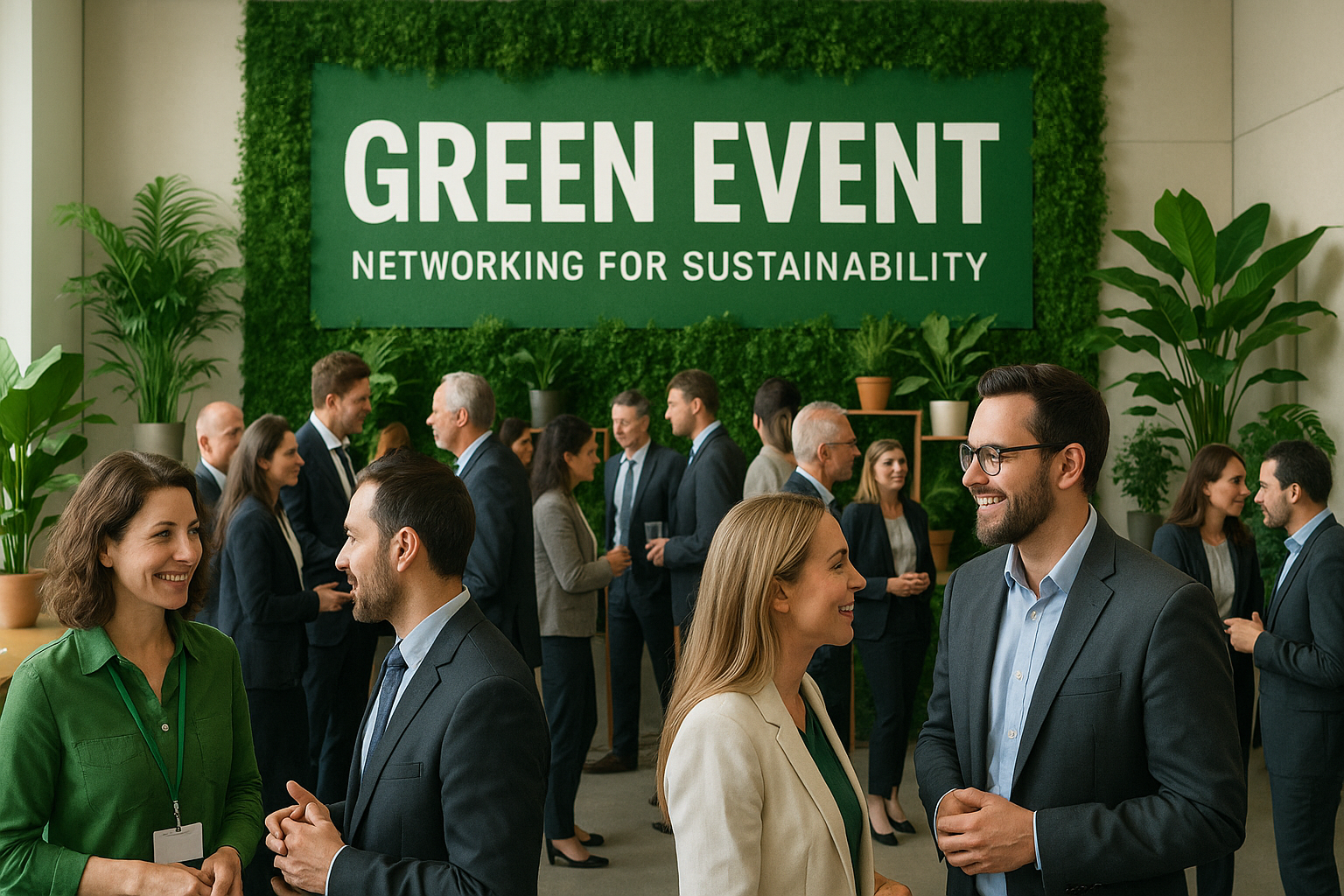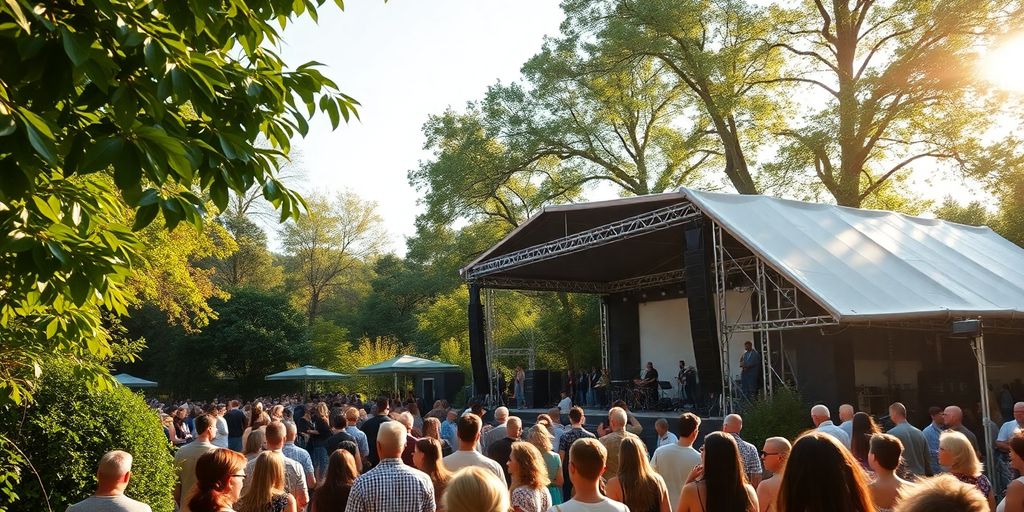Register as an organizer
Click the button below and finish your organizer registration, or fill out the form and we will be in touch to assist you.

The world of events is changing. People are more aware of environmental issues, and Europe has new rules about being green. This means event planners and venues need to step up their game. We're talking about everything from how much trash an event makes to where the food comes from. This article will look at what these new rules mean and how event businesses can make sure they're doing things the right way. It's not just about following rules; it's about doing good business and helping the planet.
The environmental impact of meetings, events, and conferences is hard to ignore. From the carbon emissions produced by travel to the sheer amount of waste from single-use items, our industry leaves a big mark on the planet. It's our job as professionals to lessen these effects by using sustainable practices.
Cutting down on carbon emissions is super important. This means picking venues that are energy efficient, pushing for public transportation, and using virtual or hybrid event options to cut down on travel. Think about it: fewer flights, less gas, and a smaller environmental impact overall. We can also look at WTO Members to help with decarbonization.
Reducing, reusing, and recycling should be the norm. Instead of printed materials, go digital. Use reusable or compostable stuff, and make sure there are good waste sorting options available. It's about making smart choices that add up to less waste ending up in landfills.
Where we get our stuff matters. Choosing local and sustainable suppliers can make a big difference. This means looking for vendors who are committed to eco-friendly practices and ethical sourcing. It's about supporting businesses that are doing their part to protect the planet.
Think about the food you serve at events. Can you source it locally? Are there sustainable catering options available? These small choices can have a big impact.

Beyond just the environment, the social side of sustainability is super important. Our industry needs to be inclusive, fair, and supportive of the communities where we do business.
We need to commit to diversity in who speaks, who's on panels, and who attends our events. It's about making sure everyone feels heard and respected. This also means making sure events are accessible for people with disabilities. Here are some ways to improve:
Getting involved with local communities is a big deal. This could mean using local suppliers, involving community members in planning, or even organizing community service as part of the event. It's about giving back and making a positive impact. For example, the CSRD's influence on event planning highlights the importance of community engagement.
Events can leave a lasting positive impact on the communities that host them. By focusing on local partnerships and initiatives, we can ensure that our events contribute to the well-being of the areas where they take place.
It's important to make sure everyone working at an event is treated fairly and supported. This includes organizers and on-site staff. Fair labor practices and support for well-being are essential. Here are some things to consider:
Good governance and ethical behavior? Super important for sustainability. We, as event industry folks, need to hold ourselves to high standards. It's about doing the right thing, even when no one is looking.
We need to be open about our sustainability efforts. This means sharing data on things like our carbon footprint, how much waste we're producing, and the impact we're having on the community. No hiding anything! Think of it like this:
It's not enough for us to be sustainable; we need to work with others who are too. Ethical partnerships are key. This means choosing suppliers and vendors who share our commitment to sustainability. Do your homework!
Partnering with organizations that share your values is essential. Make sure they have the same commitment to sustainability and ethical practices as you do.
Sustainability isn't a one-time thing; it's a journey. We need to always be looking for ways to improve. This means staying up-to-date on the latest best practices and being willing to try new things. Here's how:
The European Union is really pushing for sustainability, and that means big changes for everyone, including the meeting and event industry. New rules are coming into play, and if you're not ready, you're going to be left behind. It's not just about feeling good anymore; it's about following the law and staying competitive.
The Corporate Sustainability Reporting Directive (CSRD) is a game-changer. It basically forces companies to be way more open about their environmental and social impact. This isn't some optional thing; it's a legal requirement. Companies have to report on everything from their carbon footprint to how they treat their employees. And guess what? That includes the events they host. If you're an event organizer, your clients are going to be asking some tough questions. This is where understanding ESG data becomes important.
So, how does all this affect event organizers? Well, for starters, you need to start thinking about sustainability in every aspect of your events. That means:
It's not just about ticking boxes; it's about making real, meaningful changes. Clients will want to see proof that you're taking sustainability seriously. They'll want data on carbon emissions, waste reduction, and social impact. If you can't provide that, they'll go somewhere else.
Okay, so how do you actually integrate ESG principles into your operations? Here are a few ideas:
And remember, it's not a one-time thing. It's about continuous improvement. The world is changing fast, and you need to stay ahead of the curve. By embracing ESG principles, you can not only comply with regulations but also create more sustainable and successful events. It's a win-win for everyone.
To really show you're serious about sustainability, it's not enough to just say you are. You need to back it up with recognized standards and certifications. Think of them as a way to prove you're doing what you say you're doing, and that you're committed to doing it right.
The Event Industry Council (EIC) has put together some pretty thorough sustainability standards. These standards give you a framework for managing events in a sustainable way. They cover everything from the initial planning stages to how you communicate about the event, and even the day-to-day operations. If you follow these standards, you can be sure your events are responsible when it comes to the environment, social issues, and the economy.
ISO 20121 is an international standard specifically for sustainable event management. It's a practical guide for figuring out and dealing with the negative impacts events can have on society, the economy, and the environment. Getting ISO 20121 certification shows that you're serious about sustainability and that you're always trying to get better.
The Meeting Professionals International (MPI) website is a goldmine of information on sustainability. They have best practices, case studies, and training materials. Using these resources can help you stay up-to-date and put effective sustainability plans into action. MPI also provides certificates, such as the "Going Local" certificate, which focuses on incorporating local resources and reducing the carbon footprint of events.
It's important to remember that these standards and certifications aren't just about ticking boxes. They're about making a real commitment to sustainability and creating events that have a positive impact. It's about showing your clients, your employees, and the world that you care about the future.
Delegates and attendees are getting more aware and concerned about sustainability. They want the events they go to show their values and help the world. The event industry needs to step up and put ESG principles into how things are done.
It's important to clearly tell people about your sustainability plans. Let them know how they can help, like cutting down on waste or joining carbon offset programs. For example, you could have signs that explain how to properly sort recycling at the event. Or, you could send out an email before the event that gives tips on how to travel more sustainably.
Put systems in place to hear what attendees think and expect about sustainability. Use this info to keep making things better. I mean, how else are you going to know if you're doing a good job? You could use surveys, suggestion boxes, or even just talk to people during the event.
Lead by example. Come up with new ideas in areas like sustainable event tech, green venue design, and socially responsible programming. Inspire others in the industry to do the same.
It's not enough to just do what everyone else is doing. You need to be thinking about what's next and how you can make your events even more sustainable. This could mean using new materials, finding new ways to reduce waste, or even just changing the way you think about events.

Sustainability isn't just a nice-to-have anymore; it's a must-have for business success. Companies that embrace sustainable practices are not only helping the planet but also setting themselves up for long-term growth and profitability. It's about more than just feeling good; it's about smart business.
Clients are increasingly demanding sustainable options. More and more, businesses and individuals want to work with companies that share their values. If you can show that you're committed to sustainability, you'll attract and keep clients who care about the environment. Many organizations now require their event planners, venues, and travel partners to have clear sustainability initiatives in place. By demonstrating a genuine commitment to sustainability, businesses can attract and retain high-value clients who align their values with eco-friendly practices.
A strong commitment to sustainability enhances brand reputation. Consumers and corporate clients alike are becoming more conscious of environmental impacts. A business that can demonstrate a proactive approach to reducing carbon footprints and promoting eco-friendly practices is likely to build stronger relationships and trust with its clients. Being seen as a sustainability leader not only differentiates you from competitors but also fosters long-term loyalty.
In today's market, sustainability can give you a real edge. Companies that prioritize sustainability are often seen as more innovative and forward-thinking. This can help you stand out from the competition and attract investors, employees, and customers. It's about positioning yourself as a leader in a world that's increasingly focused on environmental responsibility.
Embracing sustainability isn't just about doing the right thing; it's about building a stronger, more resilient business for the future. It's about aligning your values with your business goals and creating a positive impact on the world.
Here's a quick look at how sustainability can impact your bottom line:
So, as you can see, being good about sustainability isn't just a nice idea anymore; it's really important for events. We've got to make sure our events are good for the planet and for people. If we do things the right way, like following the rules and using good standards, our events will keep being popular and important. It's up to us to make sure our industry keeps going strong and does good things for the world.
The Corporate Sustainability Reporting Directive (CSRD) is a new rule from the European Union. It makes companies share more details about how they affect the environment and society, like their carbon footprint. For event planners, this means clients, especially in Europe, will increasingly ask for reports on carbon emissions from travel, venues, food, and drinks. Even if you're not directly under CSRD, you might need to help your clients meet their reporting duties.
You can track emissions by collecting key information from your event, like how people traveled, how much energy the venue used, and how much waste was produced. There are tools and methods to help you figure out the carbon footprint for each part of your event.
Yes, many clients, especially big companies and government groups, now look for partners who care about sustainability. Showing that you are serious about being green can help you get and keep valuable clients who share those values.
Being sustainable improves your company's image and builds trust. When you show you care about the planet and people, it makes your brand stronger and more respected. This can give you an edge over competitors.
Start by looking at your current practices. Think about ways to cut down on waste, save energy, and choose eco-friendly suppliers. You can also use tools to track your environmental impact and set clear goals for improvement.
There are several standards and certifications, like the Event Industry Council Sustainability Standards and ISO 20121. These give you a roadmap for managing events in a way that is good for the environment, fair to people, and makes good business sense.
More blogs
Click the button below and finish your organizer registration, or fill out the form and we will be in touch to assist you.